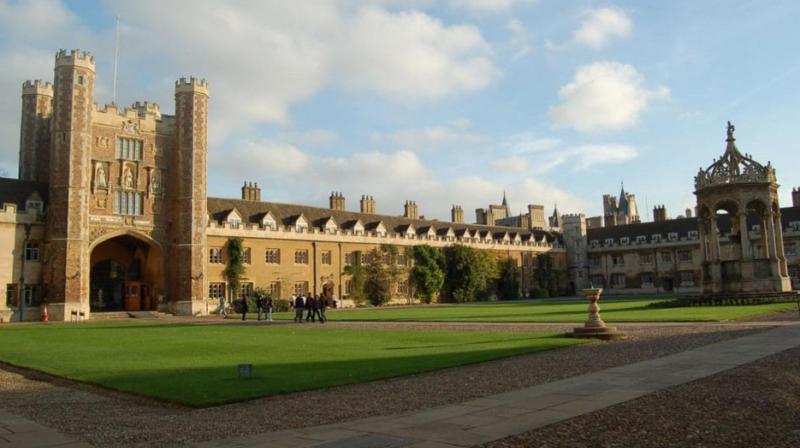Abolishing merit ranking a good idea
If you pause and think a bit you will appreciate how difficult it is to attain the honour of the wooden spoon.

Cambridge University was perhaps the first to introduce examinations in mathematics. A typical old caricature of Cambridge shows a candidate sitting on a tripod facing a bunch of fierce examiners sitting at a table. Although the examiners are fierce looking, they are usually shown indulging in a sarcastic laugh. Because the candidate is completely foxed by the question asked and that is a plus point for the examiner who set that question. The presence of the ubiquitous tripod may be linked to the name given to the maths examination as Mathematical Tripos.
Considerable ritual surrounded the Tripos. Being a tough examination, those who came through it with flying colours commanded respect and admiration. So those who got a first class were called Wranglers and the candidate who scored the highest number of marks thereby topping the list of wranglers was called the Senior Wrangler. The senior wrangler was highly respected and amongst other privileges, he was the first to be given a degree at the annual convocation.
But while we may understand the respect accorded to the top candidate, the old Cambridge tradition also singled out the last candidate on the pass list. This gentleman was designated the winner of the so-called wooden spoon. While he received his degree from the vice-chancellor in the Senate House, his classmates would lower a wooden spoon from the balcony of the Senate House.
If you pause and think a bit you will appreciate how difficult it is to attain the honour of the wooden spoon. For, you must perform worse than anybody else who passed in the examination. At the same time you must perform well enough to pass!
However, in the year 1909, the University took a deliberate decision of abolishing the disclosure of the rank of the candidate. Thus all wranglers were deemed equal and they were listed on the result sheet in alphabetical order. So post-1909 there have been officially no senior wranglers or wooden spoons.
Why did the University take this decision? It discovered that giving excessive importance to ranking led to unhealthy competition amongst the candidates.
Also, career studies of senior and other high-ranked wranglers did not show a definitive trend of high research productivity. On the other hand many scientists and mathematicians who did excellent research had not necessarily attained a high rank in the Tripos.
With its long history the mathematical tripos has generated many legends and jokes of which the following is an example:
Two Cambridge professors, one of mathematics and the other of economics were arguing as to whose subject was more difficult and put a greater pressure on the candidates at the time of the tripos examination. The mathematician argued: “We set new problems every year in our exam. Thus our students cannot be certain what the questions would be like and whether their practice with previous years’ papers would be any help. On the other hand the economics papers, so far as I can see, contain the same questions every year.” The economist paused before replying giving the impression that his mathematics colleague had really stumped him. But he did come back with a fitting reply: “You see, our questions may be the same but their answers change from year to year!”
We may learn from the Cambridge experience. Ranking in a merit list does not always lead to a healthy student atmosphere. Thus in our 10th and 12th standard examinations the merit list is not disclosed. I think this has produced a healthy effect. What about questions in the papers? Should they be very difficult as in the Cambridge example above? In fact, in the olden times (pre-1909), there used to be two kinds of questions in the Tripos examinations. There were very easy questions, which were meant to be attempted by students devoted to sports or by socialites not particularly interested in study. Such students would qualify for a pass degree. Likewise, there would be difficult questions to be solved by scholars who expected to get an honours degree. Thus there were no complaints that the paper was difficult!
Perhaps it is appropriate to close with the example of Karl Pearson the eminent statistician who, as a student, was appearing in the Cambridge Tripos. Those days the examination had papers containing both easy and difficult problems. After about 10-15 minutes he noticed that the student next to him had ticked off a particular question. Karl knew that student well. He was a cricketer, and as such he was not expected to try difficult questions. So the question he had ticked off must be easy. Out of curiosity Karl looked at the question. It did not look easy and Karl tried some methods to solve it…but to no avail. Since the cricketer had solved it so soon, he must be aware of some trick to solve it, argued Pearson. To solve that question, therefore, became a challenge for him and after several attempts he managed to solve it. But this effort took all of his examination time!
Feeling that he had wasted time on an easy question, Karl was certain that he would fail in that paper. As he came out of the examination hall he asked the cricketer friend what trick he had used to solve that problem. “But I did not solve that problem”, said that worthy. “But then why have you ticked it?” asked Karl. At that the cricketer laughed and said: “That was mere doodling since I could not get a single question that I could solve”.
It turned out that that was the most difficult question and apart from Karl Pearson hardly one or two scholars had managed to solve it. For his performance Karl became the third Wrangler.
